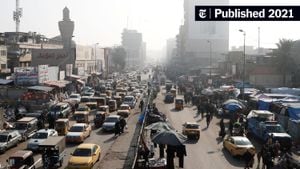Vietnam is witnessing transformative changes as digital initiatives sweep across its business sector and urban planning strategies. These steps are not merely about adopting technology but rather rethinking how processes and systems function for efficiency and sustainability.
At the forefront of these changes is the textile giant Vinatex, which began its digital transformation back in 2019. They have sought to embrace new technologies to streamline operations, and by 2022, they rolled out their electronic office (E-office) system. Pham Thi Van Ha, Project Manager at Vinatex, noted, "The tight collaboration between technology, internal teams, and deployment partners is the key to running the new system flexibly and effectively." This modernization has reportedly cut down on the time employees spent dealing with cumbersome traditional processes.
The shift to digital processes has been made easier through low-code solutions, which experts argue allow businesses to automate reporting and data flows without needing extensive coding skills. Tô Mạnh Hoàng, CEO and Founder of Datapot, emphasized the importance of choosing the right technology for smaller enterprises: "Thanks to effective BI application, we currently only need one staff to operate the information system for 1,000 learners." This clearly demonstrates how effective data management tools can lead to increased operational efficiency and reduced workloads.
On the urban development side of things, discussions have turned to the proposed Hàng Xanh Transit-Oriented Development (TOD) project, which aims to reshape urban living standards significantly. This ambitious project, estimated to cost over 8.5 billion USD, is centered around improving public transportation infrastructures, thereby enhancing the quality of life for residents. Nguyễn Văn Thành, Deputy General Director of the Infrastructure Technical Investment Company (CII), remarked, "We hope the Hàng Xanh TOD project will transform urban living like Japan, South Korea, and Singapore." This vision seeks not only to tackle chronic traffic congestion but also to redefine community layouts to favor public transit usage.
The necessity for such developments is evident. Many residents, like Nguyễn Minh Truyền, lament the daily struggles of commuting through notoriously congested routes. With roads often choked with traffic from early morning till late at night, the promise of more refined public transport options is seen as hope for alleviating these issues. "Each day commuting feels like a mental marathon just to reach work," Truyền shared, emphasizing the urgent need for effective solutions.
Meanwhile, industry experts highlight the importance of adapting the TOD approach to local needs and urban layouts. Urban planning expert PGS.TS Vũ Anh Tuấn pointed out, "We will conduct research to suggest effective and feasible TOD projects and prioritize residents’ needs during the development." This consideration aims to make sure the endogenous challenges of urban growth are adequately addressed, emphasizing sustainability and livability.
But the project is not without its challenges; concerns about coordination among various entities and potential bureaucratic hurdles remain prevalent. For the view to be realized, collaborative efforts between private developers and government agencies are necessary to overcome the interrelated challenges of urban development and traffic management.
Implementing these initiatives effectively will require significant effort; stakeholders must engage with community members to create buy-in, ensuring the residents feel the changes will benefit their daily lives. After all, the driving principle behind TOD is not just infrastructure; it’s about improving how people live and move within their cities. CII's Thành emphasized, "We will adopt innovative planning strategies to tackle the structural issues of urban areas and improve public transportation systems. This is not just about infrastructure, but about creating thriving communities what care for their inhabitants and the environment around them."
Undoubtedly, these digital transformation initiatives, alongside the ambitious Hàng Xanh TOD project, signal exciting times for Vietnam. With the intent to build sustainable, efficient, and tenant-friendly urban spaces, the future looks promising for Vietnamese citizens, as they are at the heart of this transformation endeavor.



